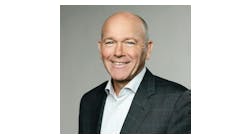Oct. 02--Boeing CEO Jim McNerney credits South Carolina's elected officials and education system for his "ahead of schedule" local Dreamliner complex and called hiccups at that plant "growing pains" typical of a new airplane with a new engine.
Speaking at a business forum Monday in Charleston, McNerney hinted further expansion of Boeing's North Charleston operations is likely as long as that government support and the maturation of the 6,000-member workforce here continue.
"And so I think growth will come here as Boeing grows, because this is the growth engine of the Boeing Company. This is the flagship of our wide-body airplane business," said McNerney.
"So I think, given good execution and fulfilling the promise that I see now, I see steady growth," he said. "Now, exactly when that happens and the form that it happens in, we'll see. But I think there's a good growth pattern."
As for the first S.C.-built 787 whose delivery to Air India has been serially postponed, most recently last week, McNerney said "all the folks in Charleston have done their job" and now it's "just a matter of India getting some regulatory and financing things straightened out."
Air India took its first two Everett, Wash.-made 787s from the complex near the airport last month but had been seeking bridge financing for the next four of 27 airplanes it has on order.
"But I anticipate it to all be done in the next ... actually, few days and weeks," he said during a brief conversation with reporters after his speech.
Pro-business rally
McNerney, who leads the 170,000-employee aerospace giant from its headquarters in Chicago, traveled to the Lowcountry to headline "Revitalizing America: Carolina Strong," a kind of business pep rally staged on the top floor of the College of Charleston Stern Student Center.
Before and after McNerney, a who's who of local business executives and public officials selected by U.S. Rep. Tim Scott, R-S.C., articulated their typical stances on harbor deepening, science education and government regulation.
Trident Technical College President Mary Thornley, the moderator, kept the mood light with off-the-cuff remarks about panelists.
Scott, who is stoutly pro-business and anti-government regulation, insisted the event was not geared toward his re-election next month. He said this installment of the "Revitalizing America" series was originally supposed to be in late November as a preview of 2013 but had to be moved up to the first day of the federal fiscal year to accommodate McNerney's schedule.
Regardless, panelists frequently used the microphone to promote themselves and praise Scott -- McNerney called him a "rock star" -- while everyone vigorously networked in the audience during breaks.
Boeing South Carolina
McNerney, whose company received an estimated $900 million in incentives from the South Carolina, visited Charleston at a busy time for Boeing. The airframer is in the midst of increasing production of several of its commercial jet programs, finalizing design of future airplanes and strategizing for the looming American military cuts.
And Monday was the day some 20,000 members of Boeing's engineers' union in Washington voted on, and were expected to reject, a new contract proposal.
Last week, a Boeing engineering executive told The Seattle Times an expensive union contract could result in engineering work being placed outside the Puget Sound region.
On Monday, McNerney would not say how Boeing South Carolina, which is famously nonunion, might be affected by the contract negotiations.
"I anticipate a successful resolution over the next few weeks," he said, "and we value both the union employees and the non-union employees in our company."
Earlier this summer, McNerney gave his local nonunion complex a mixed grade, calling the aft-body factory near Charleston International Airport "a hotspot for us." On Monday, he spoke of "growing pains" at the young Boeing South Carolina operation, whose final assembly factory just opened in June 2011.
"But I would characterize it more as normal than abnormal," he said. "And the people have responded magnificently out there. And we're in good shape. ... We're ahead of the schedule we laid out two-and-a-half years ago when we started this."
McNerney said that progress would not be hampered by the failures of General Electric-made engines on a Boeing 787 in North Charleston in July and a 747-8 freighter in Shangai last month.
The Federal Aviation Administration has ordered all in-service GEnx engines be checked every 90 days for drive-shaft cracks, which had been found in two 787 engines. Chinese authorities are still investigating the 747 GEnx engine failure that seems to have a separate cause.
"It'll keep marching ahead," he said of the 787 program, which has delivered 25 planes since deliveries began in September 2011, more than three years late. "And again, growing pains are not unusual in new engines and new airplanes."
Reach Brendan Kearney at 937-5906 and follow him on Twitter at @kearney_ brendan.
Copyright 2012 - The Post and Courier, Charleston, S.C.





